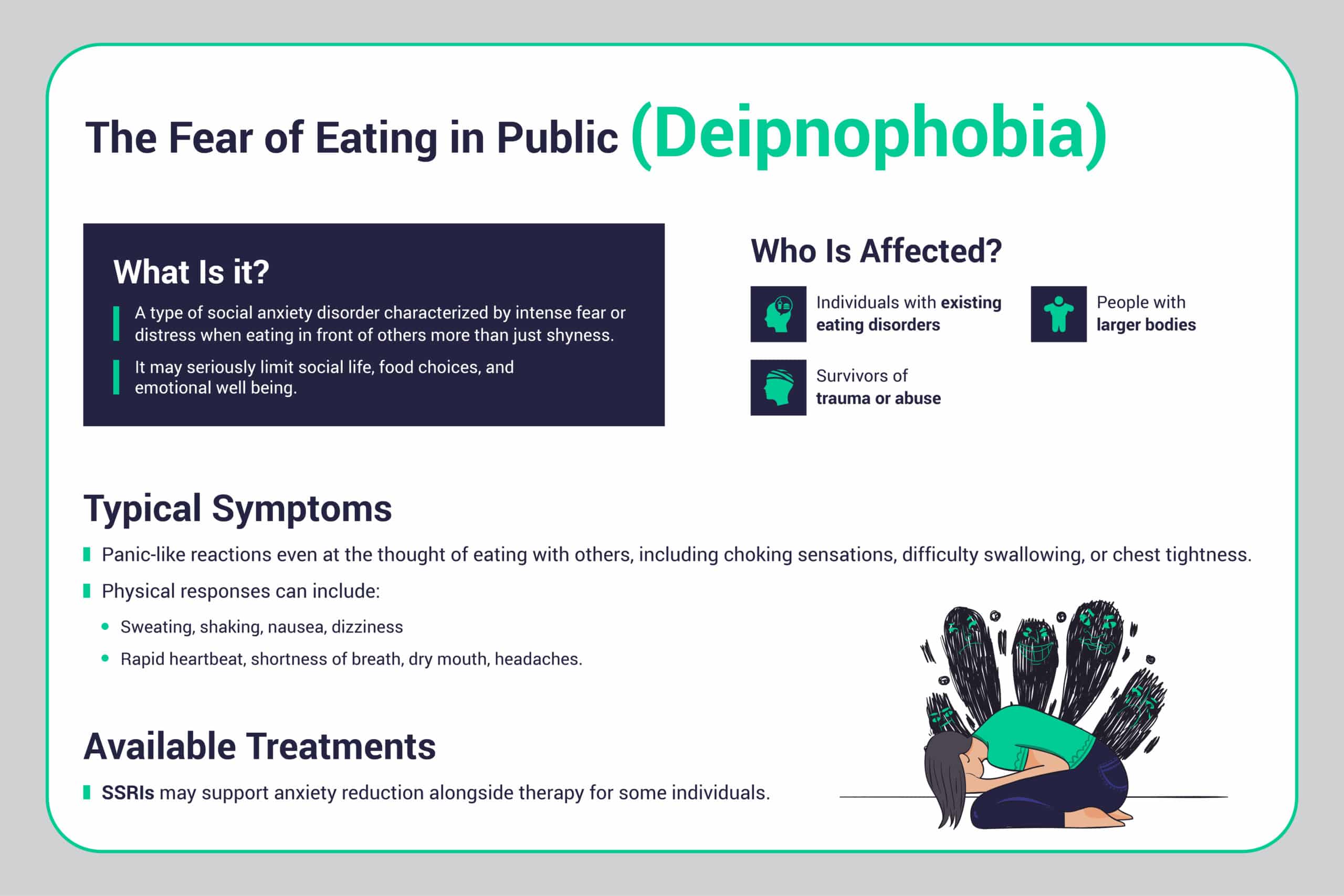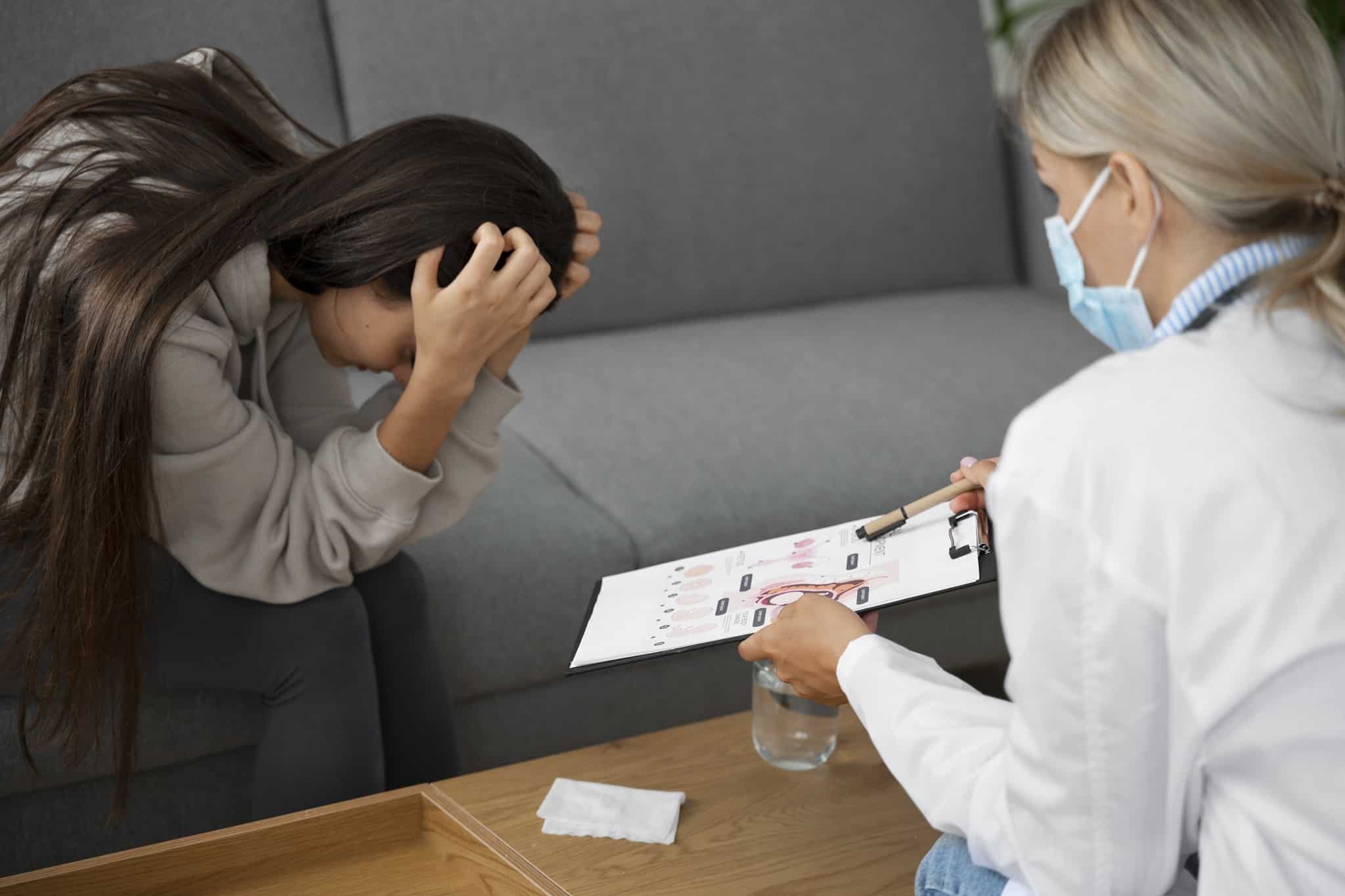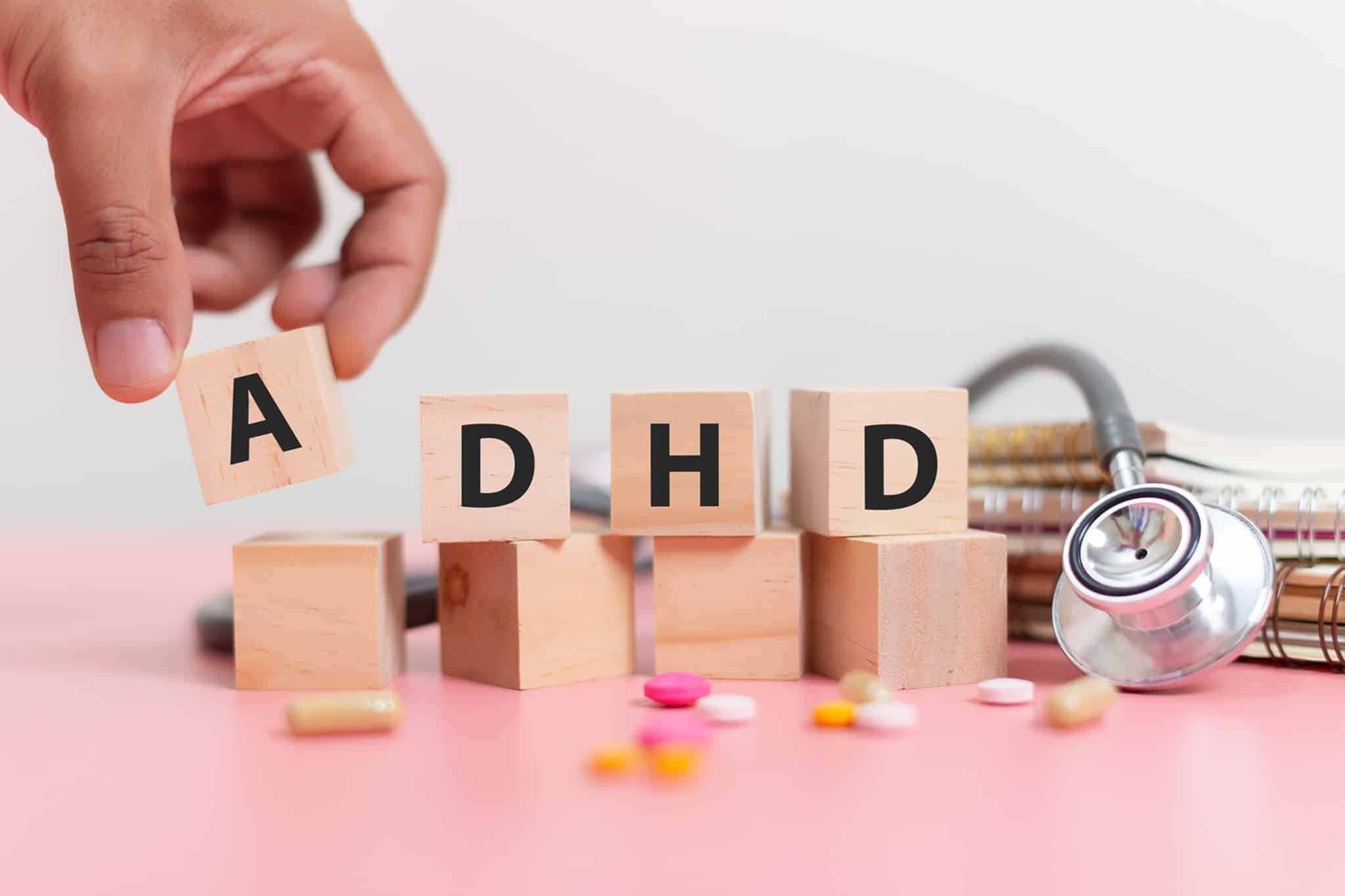Public eating anxiety, sometimes known as Deipnophobia, is more than just feeling shy at a dinner table. It’s a deep fear of eating in front of others, often linked to eating disorders like binge eating disorder or bulimia nervosa. This anxiety can feel overwhelming, especially in social settings like school cafeterias, restaurants, or family gatherings.
For many, public eating anxiety is based in trauma, body image fears, and a fear of judgment. If public eating anxiety is not treated, it can contribute to disordered eating or regulation patterns- or solidify existing patterns of disordered eating. Luckily, eating disorder treatment centers now provide specific methods to help individuals eat self-compassionately and confidently with others!
The Psychology Behind Public Eating Anxiety
What Is Deipnophobia?
Deipnophobia is the intense fear of eating in front of others. Unlike general social anxiety, which can affect a wide range of interactions, this fear is focused specifically on eating-related situations.
People with this condition may avoid meals in public, skip social gatherings, or eat only in private. While it might seem like a minor quirk, Deipnophobia can seriously affect mental health and daily life. In many cases, it hides deeper issues such as low self-esteem, past bullying, or undiagnosed eating disorders.

Common Triggers and Psychological Factors
Some common triggers for disordered eating are being made fun of regarding diet and weight beliefs or a social event gone poorly and eating and dieting were part of it, or being told to eat a particular way. People may find themselves worried about chewing loudly, spilling food, or being judged, among other things.
One of the symptoms of this disorder is repeating these thoughts and experiences over time and developing a strong emotional connection in relation to them…it’s not about food; it’s about shame, anxiety, and fear of being witnessed.
Identifying the Symptoms of Binge Eating Disorder and Other Coexisting Conditions
Symptoms of Binge Eating Disorder
Binge eating disorder is one of the most prevalent disorders in the U.S. It involves eating a very large amount of food the size of a large meal, in relationship to time, and with an experience of a loss of control.
Those with binge eating disorder will often be excessively full, sometimes too full to move; eating in secret and feeling shame afterward for what they did. They may eat to relieve devastation from a death or work stress. The person will feel relief, but subsequently will feel even more emotional pain.
Binge eating symptoms can be exacerbated when someone who suffers from binge eating disorder also has social eating anxiety. These people will avoid eating in public at all costs by all means possible, only to binge privately a moment later which is very distressing.
Coexisting Conditions
Many people with binge eating disorder also struggle with anxiety, depression and self-image issues. These conditions make eating in public extremely difficult for many people with social anxiety. These people may avoid eating with people as a means to avoid attention.
If these conditions are comorbidities, the person’s low self-regard or negative self-image results in self-criticism, making eating even worse by needing to maintain a level of thinking, which critically makes eating a spotlight moment rather than just a basic human need.
These levels of emotional pain need more than willpower. They need compassion and care.
How Eating Disorder Treatment Centers Address Public Eating Anxiety
Role of Eating Disorder Treatment Centers
Eating disorder treatment centers take a whole-person approach. These centers bring together a team of therapists, dietitians, and medical professionals to create a care plan tailored to your needs.
Treatment focuses on more than just food. It supports mental health, emotional healing, and relationship repair. Centers may offer outpatient or inpatient programs depending on the level of care needed.
The goal is to treat both the fear of eating in public and the disordered patterns that come with it.
Exposure-Based Therapies for Public Eating Fear
A main tactic is exposure therapy, where clients face eating in public or in social situations in a gradual manner and in a controlled and safe manner. You might start with eating a snack in front of one person you trust, then gradually work your way towards eating meals with multiple strangers. Over time, the anxiety around these experiences diminishes.
Cognitive-behavior therapy (CBT) is often used to help change negative beliefs about food and your body. You will learn many of the skills in these forms of therapy that will help you manage anxiety and regain some sense of trust in yourself.
Inpatient Eating Disorder Treatment for Severe Anxiety
When Is Inpatient Treatment Needed?
Inpatient eating disorder treatment is helpful when one is experiencing public eating anxiety that is severely disrupting their life. This level of care is appropriate for individuals who are avoiding meals altogether, dealing with co-occurring trauma, who are experiencing suicidal thoughts or self-harming behaviors.
If someone is unable to function when it comes to nutrition, or socializing without the encouragement of others, inpatient treatment offers a clinical environment that is highly structured and provides a healing space.
Benefits of Inpatient Eating Disorder Treatment
Inpatient treatments allow for daily therapy sessions and round-the-clock assistance.
Inpatient programs offer structured group meals with support at all times, where individuals eat meals with fellow clients who are sharing in their battle with eating issues.
This diminished sense of isolation, framework of community, of and practical support taught will help someone with their long-term recovery process.
Specialized Approaches for Higher Weight Individuals Facing Public Eating Anxiety
Management of Eating Disorders for People with Higher Weight
Eating in public exposes larger-bodied individuals to additional scrutiny. That sense of shame can contribute to disordered eating and anxiety.
Eating disorder clinics must take direct and intentional action to address weight bias. Everyone deserves to be treated with compassion and empathy, regardless of their size.
Weight-inclusive treatment emphasizes health behind the number on the scale; the goal is healing not shrinking. When a person feels safe and is accepted for who they are, they can begin their recovery journey when they are ready.
Accessing Support Through an Eating Disorder Clinic or Mental Health Services
Choosing the Right Eating Disorder Clinic
Finding a clinic may feel overwhelming, however it is helpful to remember that the right clinic will make all the difference.
When looking, search for clinics that also have a flexible menu of treatment options available to their clients, have a supportive team, and provide care as per your schedule – in person or online.
Online mental health services can be incredibly helpful especially for those experiencing anxiety related to attending a clinic for treatment or are discovering eating in a different and/or new environment role in their recovery.
Expanding Access to Mental Health Services
You don’t have to do this alone. Don’t be afraid to look for teletherapy options. There are peer support groups in the community and nonprofit clinics that can help increase access to eating disorder support and treatment options.
You can reach out to your local community mental health services and see what services are available to you. Many will have sliding scales or recommend insurance friendly options.
Take a look at other options such as peer support groups, another non-judgmental space to meet others and share your journey. Healing becomes stronger and easier when you feel understood.
Faqs:
Is fear of eating in public always an eating disorder?
A: No. It may exist alone or be linked to anxiety. But if it causes distress or leads to harmful eating patterns, professional support can help.
Can public eating anxiety exist without binge eating?
A: Yes. Somebody may restrict food, avoid meals, or experience unease from the act of eating without binge eating. Each individual’s experience is different.
How can I stop the despairing cycle of binge eating disorder?
A: You can start with regular meals and self-compassion. Try to avoid restriction, reflect on when you are feeling emotionally activated, and consider self-help-based strategies or Cognitive Behavioral Therapy or Therapy to help you break the binge eating cycle.
What are some tips to avoid binge eating before bed?
A: Mindful and balanced meals throughout the day, a calming bed time routine, assess if you are eating for emotional or physical hunger, and mindful snacks leading up to sleep can all help you.
How can I stop spending all my money on binge eating?
A: Consider a week-to-week food budget, limit your access to cash during emotional triggers or just the act of eating out, and try some other coping mechanisms. Cognitive Behavioral Therapy or therapy can help guide you away from emotional or careless spending habits as well.
Q: What if I have an eating disorder but don’t want help?
A: That is totally fine. Consider exploring your thoughts, writing in a journal, or joining a support group. Recovery can start before you are ready for full recovery and treatment.






